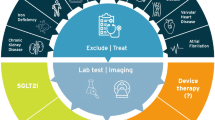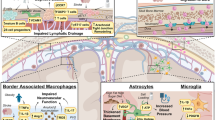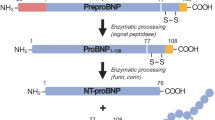Abstract
Chronic heart failure (HF) is a disorder characterized in part by immune activation and inflammation. Thus, patients with HF have elevated levels of a number of inflammatory cytokines, both in the circulation and in the failing heart itself. Several mechanisms for this immune activation, which are not mutually exclusive, have been suggested, including neurohormonal activation, hemodynamic overload, and activation of the innate immune system secondary to cardiac stress. Importantly, experimental studies have shown that inflammatory cytokines such as tumor necrosis factor-α, interleukin-1β, and monocyte chemoattractant peptide-1 may contribute to the development and progression of HF by promoting myocardial hypertrophy, activating matrix metalloproteinases, provoking contractile dysfunction, and inducing apoptosis. However, inflammatory cytokines may also have adaptive and cardioprotective effects. This important aspect of cytokine biology must be kept in mind when designing new immunomodulatory treatment modalities in HF.
Similar content being viewed by others
References and Recommended Reading
McMurray J, Pfeffer MA:New therapeutic options in congestive heart failure: Part I.Circulation 2002,105:2099–2106.
Levine B, Kalman J, Mayer L, et al.:Elevated circulating levels of tumor necrosis factor in severe chronic heart failure.N Engl J Med 1990,323:236–241.
Mann DL:Inflammatory mediators and the failing heart: Past, present, and the foreseeable future.Circ Res 2002,91:988–998.
Aukrust P, Ueland T, Lien E, et al.:Cytokine network in congestive heart failure secondary to ischemic or idiopathic dilated cardiomyopathy.Am J Cardiol 1999,83:376–382.
Torre-Amione G, Kapadia S, Benedict C, et al.:Proinflammatory cytokine levels in patients with depressed left ventricular ejection fraction: a report from the studies of left ventricular dysfunction (SOLVD).J Am Coll Cardiol 1996,27:1201–1206.
Mallat Z, Heymes C, Corbaz A, et al.:Evidence for altered interleukin 18 (IL)-18 pathway in human heart failure.FASEB J 2004,18:1752–1754.
Aukrust P, Ueland T, Müller F, et al.:Elevated circulating levels of C-C chemokines in patients with congestive heart failure.Circulation 1998,97:1136–1143.
Damås JK, Gullestad L, Ueland T, et al.:CXC-chemokines, a new group of cytokines in congestive heart failure-possible role of platelets and monocytes.Cardiovasc Res 2000,45:428–436.
Damås JK, Gullestad L, Aass H, et al.:Enhanced gene expression of chemokines and their corresponding receptors in mononuclear blood cells in chronic heart failure-modulatory effect of intravenous immunoglobulin.J Am Coll Cardiol 2001,38:187–193.
Torre-Amione G, Kapadia S, Lee J, et al.:Tumor necrosis factor-alpha and tumor necrosis factor receptors in the failing human heart.Circulation 1996,93:704–711.
Eiken HG, Øie E, Damås JK, et al.:Myocardial gene expression of leukaemia inhibitory factor, interleukin-6 and glycoprotein 130 in end-stage human heart failure.Eur J Clin Invest 2001,31:389–397.
Prabhu SD, Chandrasekar B, Murray DR, Freeman GL:Beta-adrenergic blockade in developing heart failure: effects on myocardial inflammatory cytokines, nitric oxide, and remodeling.Circulation 2000,101:2103–2109.
Wei GC, Sirois MG, Qu R, et al.:Subacute and chronic effects of quinapril on cardiac cytokine expression, remodeling, and function after myocardial infarction in the rat.J Cardiovasc Pharmacol 2002,39:842–850.
Brasier AR, Recinos A 3rd, Eledrisi MS:Vascular inflammation and the renin-angiotensin system.Arterioscler Thromb Vasc Biol 2002,22:1257–1266.
Werner C, Werdan K, Ponicke K, Brodde OE:Impaired beta-adrenergic control of immune function in patients with chronic heart failure: reversal by beta1-blocker treatment.Basic Res Cardiol 2001,96:290–298.
Of importance Jankowska EA, Ponikowski P, Piepoli MF, et al.:Autonomic imbalance and immune activation in chronic heart failure — pathophysiological links.Cardiovasc Res 2006,70:434–445. Elegant review discussing neurohormonal activation and in particular autonomic imbalance as causes of immune activation in HF.
Shioi T, Matsumori A, Kihara Y, et al.:Increased expression of interleukin-1 beta and monocyte chemotactic and activating factor/monocyte chemoattractant protein-1 in the hypertrophied and failing heart with pressure overload.Circ Res 1997,81:664–671.
Singal PK, Khaper N, Palace V, Kumar D:The role of oxidative stress in the genesis of heart disease.Cardiovasc Res 1998,40:426–432.
Knuefermann P, Vallejo J, Mann DL:The role of innate immune responses in the heart in health and disease.Trends Cardiovasc Med 2004,14:1–7.
Satoh M, Shimoda Y, Maesawa C, et al.:Activated toll-like receptor 4 in monocytes is associated with heart failure after acute myocardial infarction.Int J Cardiol 2005,109:226–234.
Eriksson U, Ricci R, Hunziker L, et al.:Dendritic cell-induced autoimmune heart failure requires cooperation between adaptive and innate immunity.Nat Med 2003,9:1484–1490.
Dunzendorfer S, Lee HK, Soldau K, Tobias PS:Toll-like receptor 4 functions intracellularly in human coronary artery endothelial cells: roles of LBP and sCD14 in mediating LPS responses.FASEB J 2004,18:1117–1119.
Ha T, Li Y, Hua F, et al.:Reduced cardiac hypertrophy in toll-like receptor 4-deficient mice following pressure overload.Cardiovasc Res 2005,68:224–234.
Penninger JM, Bachmaier K:Review of microbial infections and the immune response to cardiac antigens.J Infect Dis 2000,181(Suppl 3):S498-S504.
Niebauer J, Volk H-D, Kemp M, et al.:Endotoxin and immune activation in chronic heart failure: a prospective cohort study.Lancet 1999,353:1838–1842.
Conraads VM, Jorens PG, De Clerck LS, et al.:Selective intestinal decontamination in advanced chronic heart failure: a pilot trial.Eur J Heart Fail 2004,6:483–491.
Yndestad A, Holm AM, Müller F, et al.:Enhanced expression of inflammatory cytokines and activation markers in T-cells from patients with chronic heart failure.Cardiovasc Res 2003,60:141–146.
Kruger S, Kunz D, Graf J, et al.:Endotoxin hypersensitivity in chronic heart failure.Int J Cardiol 2007,115:159–163.
Of major importance Hilfiker-Kleiner D, Landmesser U, Drexler H:Molecular mechanisms in heart failure: focus on cardiac hypertrophy, inflammation, angiogenesis, and apoptosis.J Am Coll Cardiol 2006,48:A56-A66. Review that includes discussion of cardioprotective effects of gp130 signaling and role of apoptosis in HF.
Palmer JN, Hartogensis WE, Patten M, et al.:Interleukn-1 beta induces cardiac myocyte growth but inhibits cardiac fibroblast proliferation in culture.J Clin Invest 1995,95:2555–2564.
Nishikawa K, Yoshida M, Kusuhara M, et al.:Left ventricular hypertrophy in mice with a cardiac-specific overexpression of interleukin-1.Am J Physiol Heart Circ Physiol 2006,291:H176-H183.
Chandrasekar B, Mummidi S, Claycomb WC, et al.:Interleukin-18 is a pro-hypertrophic cytokine that acts through a phosphatidylinositol 3-kinase-phosphoinositide-dependent kinase-1-Akt-GATA4 signaling pathway in cardiomyocytes.J Biol Chem 2005,280:4553–4567.
Woldbaek PR, Sande JB, Stromme TA, et al.:Daily administration of interleukin-18 causes myocardial dysfunction in healthy mice.Am J Physiol Heart Circ Physiol 2005,289: H708-H714.
Of major importance Wilson EM, Diwan A, Spinale FG, Mann DL:Duality of innate stress responses in cardiac injury, repair, and remodeling.J Mol Cell Cardiol 2004,37:801–811. Insightful review of adaptive and maladaptive effects of innate immune responses and inflammation in cardiac remodeling.
Flesch M, Hoper A, Dell’Italia L, et al.:Activation and functional significance of the renin-angiotensin system in mice with cardiac restricted overexpression of tumor necrosis factor.Circulation 2003,108:598–604.
Singh M, Ananthula S, Milhorn DM, et al.:Osteopontin: A novel inflammatory mediator of cardiovascular disease.Front Biosci 2007,12:214–221.
Kawano S, Kubota T, Monden Y, et al.:Blockade of NF-kappaB ameliorates myocardial hypertrophy in response to chronic infusion of angiotensin II.Cardiovasc Res 2005,67:689–698.
Of importance Rutschow S, Li J, Schultheiss HP, Pauschinger M:Myocardial proteases and matrix remodeling in inflammatory heart disease.Cardiovasc Res 2006,69:646–656. Review of inflammation and regulation of MMPs and extracellular matrix turnover in HF.
Bradham WS, Bozkurt B, Gunasinghe H, et al.:Tumor necrosis factor-alpha and myocardial remodeling in progression of heart failure: a current perspective.Cardiovasc Res 2002,53:822–830.
Gurantz D, Yndestad A, Halvorsen B, et al.:Etanercept or intravenous immunoglobulin attenuates expression of genes involved in post-myocardial infarction remodeling.Cardiovasc Res 2005,67:106–115.
Siwik DA, Chang DL-F, Colucci WS:Interleukin-1beta and tumor necrosis factor-alpha decrease collagen synthesis and increase matrix metalloproteinase activity in cardiac fibroblasts in vitro.Circ Res 2000,86:1259–1265.
Wang F, Trial J, Diwan A, et al.:Regulation of cardiac fibroblast cellular function by leukemia inhibitory factor.J Mol Cell Cardiol 2002,34:1309–1316.
Ueland T, Yndestad A, Øie E, et al.:Dysregulated osteoprotegerin/RANK ligand/RANK axis in clinical and experimental heart failure.Circulation 2005,111:2461–2468.
Aggarwal BB:Signaling pathways of the TNF superfamily: a double-edged sword.Nat Rev Immunol 2003,3:745–756.
Kumar A, Haery C, Parrillo JE:Myocardial dysfunction in septic shock.Crit Care Clin 2000,16:251–287.
Of major importance Prabhu SD:Cytokine-induced modulation of cardiac function.Circ Res 2004,95:1140–1153. Extensive review of effects on modulation of cardiac function by inflammatory cytokines.
Bozkurt B, Kribbs SB, Clubb FJ Jr, et al.:Pathophysiologically relevant concentrations of tumor necrosis factor-alpha promote progressive left ventricular dysfunction and remodeling in rats.Circulation 1998,97:1382–1391.
Florholmen G, Aas V, Rustan AC, et al.:Leukemia inhibitory factor reduces contractile function and induces alterations in energy metabolism in isolated cardiomyocytes.J Mol Cell Cardiol 2004,37:1183–1193.
Kang KM, Izumo S:Apoptosis in heart: basic mechanisms and implications in cardiovascular diseases.Trends Mol Med 2003,9:177–182.
Kaur K, Sharma AK, Dhingra S, Singal PK:Interplay of TNF-alpha and IL-10 in regulating oxidative stress in isolated adult cardiac myocytes.J Mol Cell Cardiol 2006,41:1023–1030.
Hirota H, Chen J, Betz UA, et al.:Loss of a gp130 cardiac muscle cell survival pathway is a critical event in the onset of heart failure during biomechanical stress.Cell 1999,97:189–198.
Of importance Morimoto H, Takahashi M, Izawa A, et al.:Cardiac overexpression of monocyte chemoattractant protein-1 in transgenic mice prevents cardiac dysfunction and remodeling after myocardial infarction.Circ Res 2006,99:891–899. Study demonstrating potential cardioprotective effects of MCP-1.
Author information
Authors and Affiliations
Corresponding author
Rights and permissions
About this article
Cite this article
Yndestad, A., Damås, J.K., Øie, E. et al. Role of inflammation in the progression of heart failure. Curr Cardiol Rep 9, 236–241 (2007). https://doi.org/10.1007/BF02938356
Issue Date:
DOI: https://doi.org/10.1007/BF02938356




